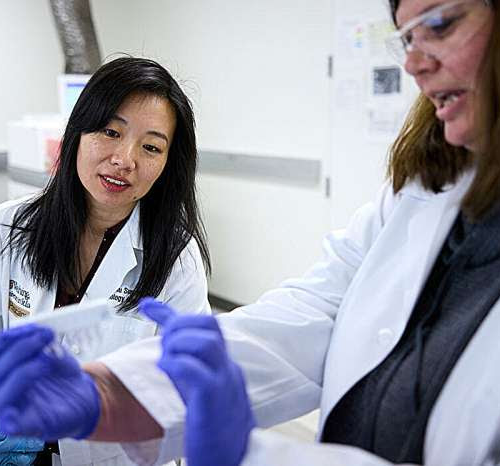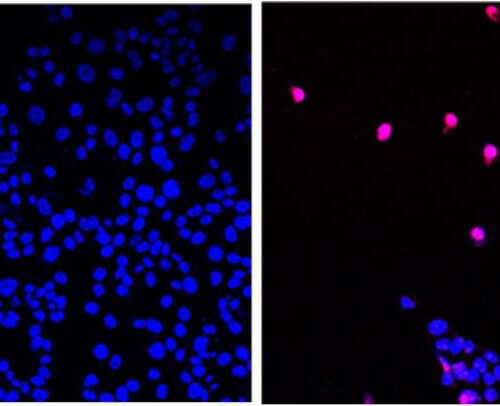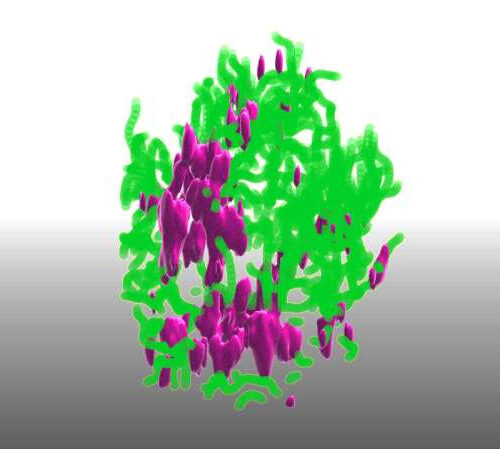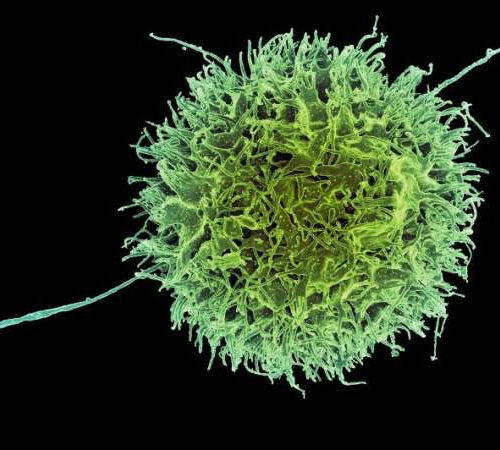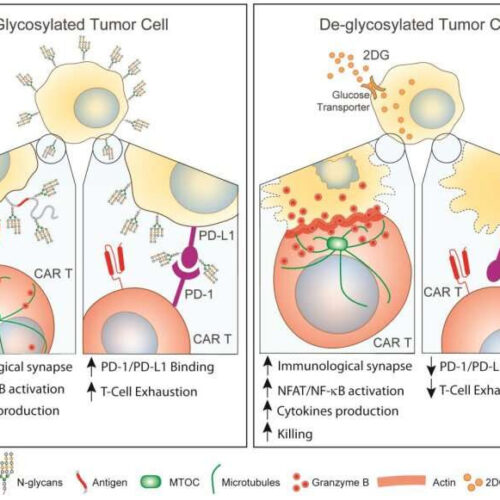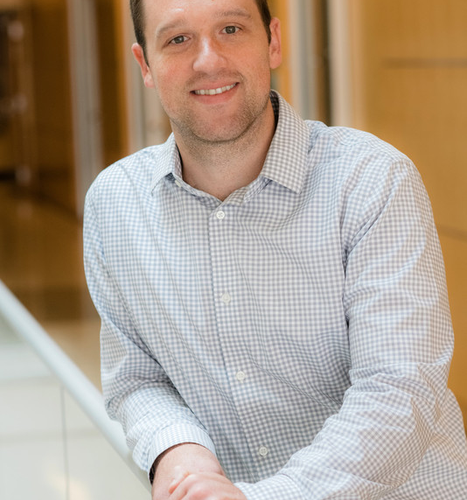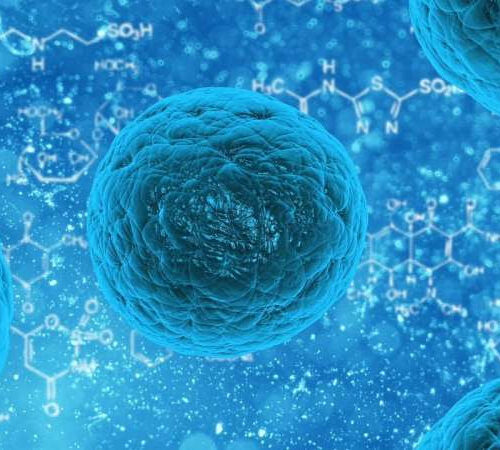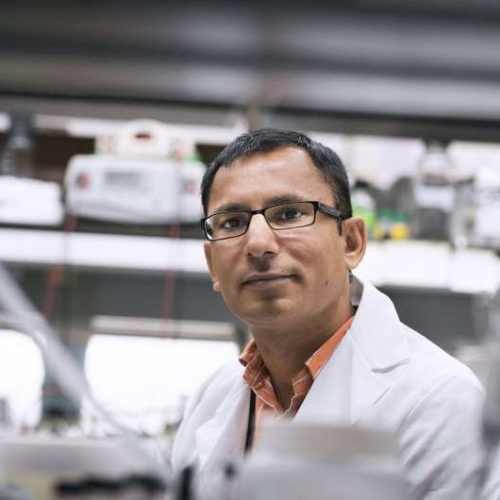by Julia Evangelou Strait, Washington University in St. Louis Shelly O’Laughlin, (right) director of clinical operations for the Genome Technology Access Center at McDonnell Genome Institute, prepares the GatewaySeq test with Lulu Sun, MD, PhD, an assistant professor of pathology and immunology. Credit: Matt Miller/School of MedicineA genetic test that identifies cancer mutations in solid tumors...
Tag: <span>solid tumors</span>
Scientists develop targeted chemotherapy able to kill all solid tumors in preclinical research
by City of Hope National Medical Center The City of Hope-developed small molecule AOH1996 targets a cancerous variant of the protein PCNA. In its mutated form, PCNA is critical in DNA replication and repair of all expanding tumors. Here we see untreated cancer cells (left) and cancer cells treated with AOH1996 (right) undergoing programmed cell death...
Why don’t T cells destroy solid tumors during immunotherapy?
by University of North Carolina Health Care 3-D image of a T cell experiencing cell stress: endoplasmic reticulum (green), mitochondria (purple). Credit: Elizabeth Hunt, UNC School of Medicine The great hope of cancer immunotherapy is to bolster our own immune cells in specific ways to keep cancer cells from evading our immune system. Although much...
New ‘killer’ immunotherapy shows early promise in range of solid tumors
by Institute of Cancer Research Colorised scanning electron micrograph of a natural killer cell from a human donor. Credit: NIAID. CC BY 2.0 A new type of immunotherapy making use of the immune system’s “natural killer cells” could offer potential against a range of cancers that can evade current treatments, early results from a phase I trial...
CAR T cell immunotherapy for solid tumors? First, you have to break the cancers’ sugar shield
by Delthia Ricks, Medical Xpress Modeling of the impact of tumor N-glycans on the targeting by CAR T cells. Left, the N-glycan decoration of tumors 1) repels CAR T cells by impeding immunological synapse formation, which tunes down transcriptional activation and overall effector functions and 2) exacerbates CAR T exhaustion by fostering inhibitory ligand–receptor pair...
Hypoxia imaging and combination therapy aid immunotherapy treatment of solid tumors
UNIVERSITY OF ALABAMA AT BIRMINGHAM IMAGE: BEN LARIMER CREDIT: UAB BIRMINGHAM, Ala. – Immunotherapy using checkpoint inhibitors can work well to treat cancer, but only a minority of patients respond to therapy. Researchers at the University of Alabama at Birmingham have now shown — in preclinical experiments — how to identify non-responding tumors and improve their response to...
CAR-T immunotherapy could be improved to kill solid tumors
by Thomas Jefferson University Cancer cell during cell division. Credit: National Institutes of Health Immunotherapy, which harnesses the power of the body’s immune system to fight disease, is gaining huge traction in treating cancer. Chief among cancer immunotherapies is a treatment known as CAR-T or chimeric antigen receptor T cell therapy. CAR-T therapy has had great...
The global race for a T cell receptor that zeros in on—and annihilates—solid tumors
by Delthia Ricks , Medical Xpress Credit: CC0 Public Domain Immunobiologists in China have designed a synthetic T cell receptor for anticancer therapy, engineering the protein not only with a capability to seek and destroy solid tumors, but endowing this cancer fighting weapon with potent endurance to get the job done. So far, the Beijing-based research has...
Cancer discovery could revive failed treatments for solid tumors
by Josh Barney, University of Virginia Research from UVA’s Jogender Tushir-Singh explains why antibody approaches effectively killed cancer tumors in lab tests but proved ineffective in people. Credit: Dan Addison, University Communications New research from the UVA Cancer Center could rescue once-promising immunotherapies for treating solid cancer tumors, such as ovarian, colon and triple-negative breast cancer, that ultimately failed...
Targeted inhibitor of mutated KRAS gene shows promise in lung, bowel, & other solid tumors
DANA-FARBER CANCER INSTITUTE IMAGE: PASI A. JÄNNE, MD, PHD v A novel agent that targets a mutated form of the KRAS gene – the most commonly altered oncogene in human cancers and one long considered “undruggable” – shrank tumors in most patients in a clinical trial with manageable side effects, researchers reported today at the 32nd EORTC-NCI-AACR Symposium on...
- 1
- 2

